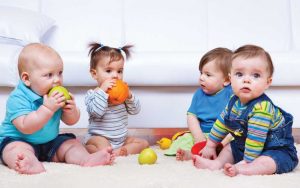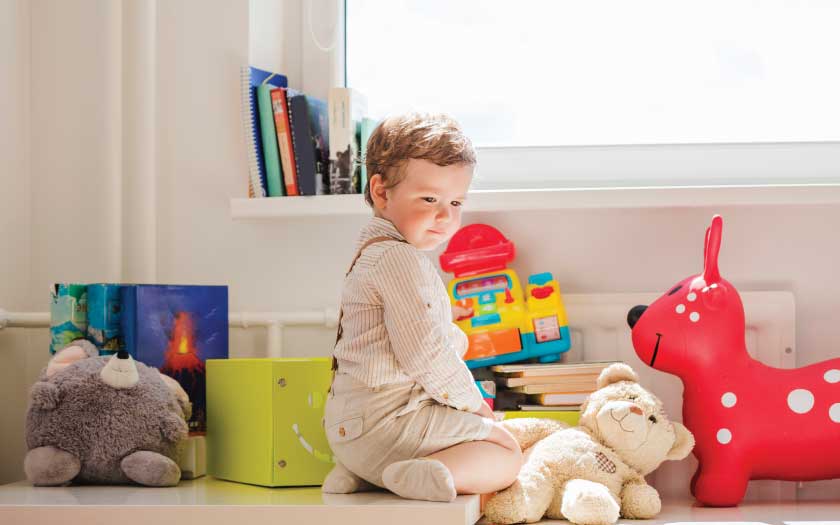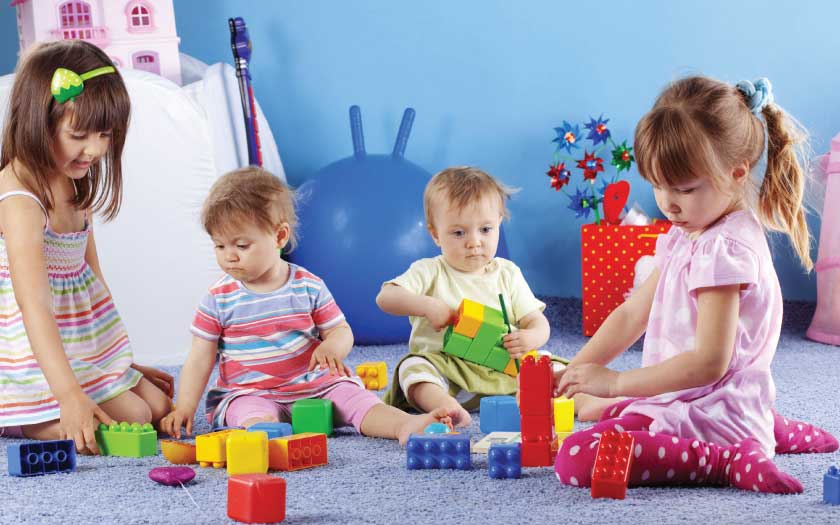Playschools, are fast becoming popular among Malaysian families as the ideal child care solution for parents who work full days, or for those who are looking for a structured environment where their little ones can get accustomed to a formal schooling environment.
How do you know if your child is ready to attend a playschool, and how do you choose the ideal one?
What are playschools anyway?
Playschools are usually flexible, standalone services offering between three and a half and five hours of care for little ones per day. They may have their formula or may even offer classes based on specific educational curriculum such as the acclaimed Montessori method, for instance. Classes are centred on play-based education for three to four-year-olds with scheduled times for meals, games, outdoor activities, rest, etc.
Operating hours of playschools in Malaysia vary, but generally, they’re between about 9 am and 12:30 pm or in the afternoon from 2 pm to 5 pm.
Beneficial and fun!
Everywhere in the world, it’s only through play that children experience their first form of learning. It’s when they make their first discoveries, solve their first problems, and develop an inclination for learning new things. Experts have long agreed too, that guided play can benefit a child’s development as much as free play — the key aims are to stimulate a child’s physical, intellectual, social, and emotional growth.
Activities at playschools are always age-appropriate, from the outdoor play facilities to their indoor provisions such as baby gymnasiums, etc. It’s during this time that a child’s ever-important motor skills can be mastered through a combination of structured activities and free-play time.
Good playschools offer lots of learning opportunities with enjoyable, engaging activities. Depending on your child’s age, centers may include blocks, dramatic play, language, math and science, music and movement, art, sensory discovery, and more.
A child’s social skills get to flourish too, especially while playing with one or more friends. A teacher’s role in playschools is to guide children in positive communication, sharing stuff, and problem-solving.
By fostering increased independence and mastery of self-help skills, little ones will eventually gain self-confidence and self-esteem that will go a long way when they step into a formal schooling environment in their near future.

Making those early years count
Early learning in these modern times starts way earlier than primary school or even kindergarten. This of course is following research and studies proving that learning opportunities and experiences of children stimulate the brain to develop thousands of connections in the first few years of life. That’s why it’s important to make those early learning experiences as enriching as possible to support the developing brain.
But… is your child ready to attend one?
A playschool, for many children, may well be one of the earliest experiences of outside-the-home activities with other children. How can you tell if your child is ready to attend one? Here are some pointers.
Potty trained
This may not seem like a big thing and some establishments may accept a child who is not yet fully potty trained. Some though, may not — especially if it’s not a parent-accompanied class. Either way, potty training your child as early as possible is a good idea during these modern times, for it’ll be generally easier to get accepted into early learning centers such as playschools.
Putting stuff back after use
In any kind of classroom setting, even in ones meant for very young children, they’ll be expected to put away things after using them. Many parents take it for granted that these are things that can be learned when they’re in the class, but it’s not always so — some children may not take too easily to this new habit, especially if they are not accustomed to it at all at home. Start initiating this habit now to prevent unnecessary issues later on.
Is your child ready to spend time with others?
Social readiness plays a pivotal role in how well a child adapts to preschool. While all parents would love to imagine their children happily making friends and playing together with other kids in a playschool or any other classes, it doesn’t always work out that way.
Some children tend to become shy and insecure in a new environment. They may even feel intimidated by the number of other children present. If you know that your child is naturally shy, it might be a good idea to utilise your home and family or friends as a training ground for crucial boost confidence in speaking to others outside of the family.
Similarly, attributes such as sharing and also taking turns when playing with toys are just as important if your child is to attend a playschool. Quick check:
- Does your child say ‘please’ and ‘thank you’ without being prompted to?
- Does junior apologise readily whenever at fault, or at least when asked to?
The most natural way for your little one to learn these skills is during peer play, so have your child participate in plenty of playdates before being enrolled in a preschool.
Lastly, a child throwing a tantrum when asked to come inside after playing while every other student was alright with it can be a handful, especially if it happens often. If junior happens to be easily agitated or is prone to acting up, it’s best to address the situation earlier on before enrolling him in a playschool.
Motor skills
Perhaps it never occurred to you that you’d have to teach your child to grasp a crayon correctly or throw a ball, but good motor skills will serve your child well during pretend play activities at a playschool. Developing fine and gross motor skills will come in handy in the classroom as well as a play, like when a child wants to maneuver through a play tunnel or climb a playground ladder.
What to look for when choosing a playschool
With so many playschools out there offering all sorts of extras, how do you find the ideal one to suit your child’s needs? Here, we go through some crucial determining factors that will hopefully help you make the best choice.
An ideal balance of playing and learning
Playschools will provide lots of learning opportunities and even some basic academic lessons, but adequate playtime is crucial! All playschools should include toys that allow for sensory-type activities. As a parent, you can easily gauge if your chosen school has adequate play options that will fit your child’s needs. Check if the playschool has items like:
- Sandbox
- Water table
- Moulding material such as safe Plastiscines
- Beanbags and cushions to dive into
Reputation and opinions count
Generally, you can tell if an environment has a good feel by the vibes you feel when you enter the premise. A good playschool should have a welcoming, friendly atmosphere and be known for its nurturing environment and stimulating curriculum.
For the best references, it will be a good idea to ask the school for the names and numbers of current parents you could call for a quick check.
Alternatively, you could try stopping by after class during pick up time and approach other parents. — Keep in mind though that references may vary, for not all parents have equal or same experiences at any given playschools. After all, we’re talking about dealing with very young children here, so do expect incidences which may leave a parent or two feelings dissatisfied with an establishment. To see the place for yourself too, and use your good judgment.
One good indicator though is the general demeanor of the kids themselves — If they don’t seem happy to be there, that’s a definite signal to cross the school out!
A worthwhile investment
High-quality child care programs such as playschools may cost a bit, but they tend to provide a well-planned curriculum with a variety of hands-on activities throughout the day. They also present little ones with opportunities to learn individually, from each other and in small groups. These learning and playing environments are generally filled with toys, books, and objects that allow children to learn through exploration and discovery.
Check out the teachers
Teachers must not only be kind, loving, and patient to their little charges but to their parents as well. The fastest and easiest way of ensuring that your child is happy under the care of their teacher is by simply observing their interactions and the child’s demeanour when around the teacher, or when you speak of the teacher.
The capability of a teacher can also be measured by the length of time that he or she has been teaching at a particular school. Seasoned, contented teachers who were happy enough to have stayed in the school for some time would be better first-time educators for your child. It also shows that the school has been good to its teachers — a definite sign of an ideal establishment.
Playground structure and safety
The playground should be well-maintained with no safety issues. Equipment and structures should be sturdy, with no loose parts, sharp edges, etc.
Inquire about teacher’s supervision at the playschool playground. Young kids can’t always gauge distances properly and aren’t capable of foreseeing potentially dangerous situations by themselves, especially when it comes to swings, slides, etc. Children generally like to test their limits with playground equipment too, so it’s important for a teacher to always be there to keep them in check.
Music, art and role-playing lessons
It does not matter if a child is musically inclined or not, children in general will reap great benefits from music classes as it helps in their cognitive and physical development. Besides learning about instruments, music class also encourages children to express themselves through song and dance, effectively cheering up their moods and boosting self-confidence. Research has also shown that little ones who have attended music or art class show an improvement in literacy and narrative skills as well.
Hygiene matters
Children’s immunities are still developing and while exposure to some level of germs may be useful, it is no excuse for a playschool to not upkeep its cleanliness. You can expect a little bit of safe mess here and there, like playdough on the floor, or misplaced toys, etc. However, the overall ambiance from a playschool must reflect a good hygienic place for children to spend time in. It will never do to have, for instance, flies hovering over a garbage bin, or on leftover food. The floors of a playschool should be safe, clean, and dry because little ones spend a lot of time sitting on it.
The toilets too should be clean enough for the teachers to help little ones with their ‘business’.

What will your child be fed?
Children who attend playschool are at the most delicate developing phase of their lives and hence since they will be spending quite some time there every week, the nutrition they’ll receive there will matter a lot. Ensure the preschool you intend to enrol your child in serves balanced meals or snacks. Remember, little ones should not be served foods that contain too much sugar and nor should they be given any form of junk food or fast food for that matter. Ask to see the weekly menu if you must, to have an idea of what they’ll be feeding your child.



